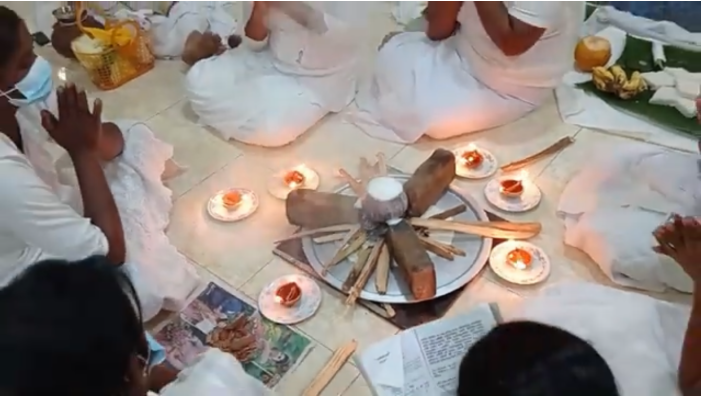Kiri Amma Dana: A Blessing for Motherhood and New Life
As doulas, we support new parents and families during one of the most powerful transitions of life, pregnancy, birth, and the early postnatal days. Across cultures and generations, rituals have helped nurture and protect mothers through this tender time. One such deeply spiritual and culturally rich tradition is the Kiri Amma Dana, a Sri Lankan ritual that I wanted to share as the Pattini Devale Festival begins, celebrated in honour of Goddess Pattini, the divine protector of women, fertility, and childbirth.
A Promise to the Divine Feminine
The Kiri Amma Dana (Milk Mother’s Offering) is more than just a ceremony, it’s a vow. Families, hoping for a safe pregnancy and birth, make promises to Goddess Pattini, offering alms in her name to seven mothers once their wishes are fulfilled. These mothers, known as Kiri Ammas, are women who have given birth and breastfed and they are considered assistants, followers, or even earthly manifestations of Pattini Amma herself.
Through this offering, we see a beautiful connection between the divine feminine and earthly motherhood of nourishment and protection.
Why Seven Mothers?
The number seven holds divine significance in this ritual. It represents the seven incarnations of Goddess Pattini, and honouring seven mothers is believed to magnify the blessings of fertility, health, and protection.
A Tamil Goddess in a Sinhala Ritual: The Shared Roots of Pattini-Kannaki
One of the most fascinating and profound aspects of the Pattini cult is its shared heritage across Tamil and Sinhala communities. Known as Kannaki Amman in Tamil traditions and Pattini Amma in Sinhala practice, this goddess is revered for her fierce virtue, chastity, and unwavering justice.
Originating from the Tamil epic Silappatikaram, Kannaki is the heroine who, after the unjust death of her husband, transforms into a goddess through her righteous rage and spiritual purity. As her story traveled across regions, she was absorbed into Buddhist and folk traditions in Sri Lanka, where she became Pattini Amma, protector of pregnant women, healer of diseases, and avenger of injustice.
In rituals like Kiri Amma Dana, we see how aspects of Tamil and Sinhala spiritual traditions are not separate but braided together, forming a shared cultural and religious memory. The use of Kannaki/Pattini in Sinhala rituals, especially those led by and for women, demonstrates a deep and historical intertwining of communities, stories, and beliefs. This ritual not only offers blessings for birth but also stands as a quiet testament to centuries of coexistence, spiritual exchange, and resilience.
The Ritual – A Dawn of Blessings
Before the sun rises, seven or fourteen Kiri Ammas, dressed in white saris and Kandyan blouses, arrive at the home where the offering will take place. Their feet are ceremonially washed with lime-infused water by the household to purify and welcome them in.
Once invited inside, the family offers a glass of water, symbolising acceptance of the danaya (alms). A variety of sweet offerings follow, all made with coconut milk to represent breastmilk. This includes:
Kiri Bath (milk rice)
Kiri Dodol (coconut milk sweet)
Konda Kavum (oil cakes)
Each item is given in sets of seven, and a plate is specially prepared for the Goddess Pattini, with coconut oil lamps lit in her honor. A panduru offering of seven coins is placed on a betel leaf and is laid at her altar.
The household gathers, including farm staff and elders, kneeling on mats while Pali chanting begins. This is to invoke protection, righteousness, and setting an ethical path for the unborn child.
Boiling Milk: A symbol of abundance
The most visually powerful part of the ritual is when a pot of milk is boiled on an open flame. As the milk rises and spills over, it symbolises abundance, blessings, and fertility. At that very moment, the Kiri Ammas begin to chant pirith. Each is then served a portion of the milk in coconut shells, sweetened with jaggery or hot water if preferred.
The dawn breaks just as the ceremony concludes, and each Kiri Amma is given a bundle of food and gifts to take home as a final act of gratitude and exchange.
Food for the Soul
Kiri Bath (Milk Rice)
Boiled white rice is enriched with thick coconut milk and a touch of salt, flattened into a tray, and cut into diamond portions. It symbolises nourishment, purity, and new beginnings.
Kiri Dodol
A sweet made with flour, jaggery, and coconut milk that is blended with chopped cashews and shaped into diamonds. This dish represents sweetness and strength.
Konda Kavum (Oil Cakes)
Deep-fried golden treats, made with rice flour, treacle, and coconut milk. The Konda Kavum variety has a knot-like top, shaped skillfully to resemble a woman’s tied hair, symbolising feminine power and grace.
Beyond Ritual: Healing, Protection, and Transformation
In parallel traditions like the Rata Yakuma, healing ceremonies are performed to protect pregnant women from spiritual harm, particularly from demonic forces. In these performances male dancers embodying female deities, is seen as a ceremonious act, bringing humans closer to divine realms.
In Madu rituals, some devotees even dress as Goddess Pattini, offering their whole being, body, spirit, and intention to channel the goddess’s power. These enactments remind us that birth, transformation, and divinity are intertwined across all boundaries of gender, culture, and time.
Honouring Our Roots, Blessing the Future
As doulas, we witness how culture and spirituality bring depth and strength to pregnancy and birth. The Kiri Amma Dana is a beautiful reminder that ancient traditions can be a powerful vehicle for protection and drawing communities together.
May we all carry forward these blessings, not just for the mothers we serve but for the generations to come.
Further Reading
Madu Pattini Blogspot - Kiri Amma Dane
A study about ‘The Kiri Amma Shanthikarmaya and Goddess Pattini’ By Kavindu Subash Galkotuwe

